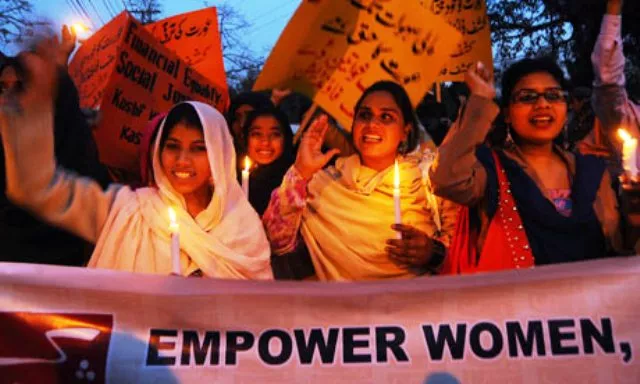
Gender disparity and education for all
For an illiterate mother, it is best to keep girls at home, so they can cook, clean and care for the younger siblings.
Each year, the United Nations announces a different theme for International Women's Day. This year celebrations revolve around the need to 'Empower rural women: End Hunger and Poverty'.
I only wish the world body would focus on the apparently-simple, yet not-so-easy aspiration of doing away with gender disparity in education.
That would be a true celebration of womanhood - to have the right to quality, universal education. If only we could celebrate no other theme but that every year, rest assured the rest of the objectives will follow almost automatically.
[http://www.youtube.com/watch?v=FvWfuQ6wQXQ&feature=related]
Global education has to be our most compelling need if we are to address the issue of poverty; it should be made part of this year's Women's Day theme. And it is also the only way to meet the Millennium Development Goals for 2015.
It is ambitious, to say the least, for us to focus on the realization of other dreams for women, while half (or more) of the population of a country remains deprived of quality education, a fundamental right awarded to every person under International Law.
Without education, girls will continue to face hunger, poverty, disease and exploitation - evils that we all aspire to see an end to. Not just that, if these young girls do survive to eventually become mothers, the next generation will inherit little more than a legacy of illiteracy, poverty and perhaps even disease. Illiterate mothers cannot possibly be expected to have knowledge of how to protect themselves or their children from the havoc of HIV/Aids, prevalent in many poor nations.
It is not all as sad as it looks, for there are success stories too.
Decision makers have been able to see the benefits that can be reaped if only girls were to have access to education. Both governments and NGOs working in the developing world are striving to develop ways of promoting primary education, volunteering academic support and in some countries, even providing life skills training.
While South Asia and sub-Saharan Africa are said to have the worst rates of female illiteracy, I met some great Masai girls in Kenya last year who were both confident and ambitious. They were keen to gain access to information and opportunities and spoke impeccable English. For a tribe that prides itself in maintaining all its traditions, right from the mud houses where they live, to the bright red sheets and colourful jewellery that they adorn, those girls were definitely a success story.
But it is also true that we still have a long way to go. The barriers to education faced by girls in the developing world must be eliminated. There has to be a clear focus on ensuring that their voices will be heard, and their needs met, before we can convince ourselves that education is indeed universal.
Poverty is a major cause of gender disparity in education - where poor families are forced to make a choice between educating their sons or daughters, the girls will inevitably be left out. But honestly speaking, even in countries where primary education is free, and books, stationary or lunches are offered as incentives, old-fashioned traditions and cultural bias prohibits girls from availing one of their most basic rights.
For an illiterate mother, with more children than she can take care of on her own, it is best to keep the girls at home, so they can help cook, clean and care for the younger ones. And early marriages, especially when they come with the added incentive of 'bride price', only aggravate the dire circumstances for a girl seeking to get educated. Parents look forward to having one less mouth to feed, along with some extra money coming their way.
Most countries, where gender disparities in terms of education prevail are unsafe, violence-prone areas of conflict. When parents are not assured that their girls will be safe going to school, especially if they must travel long distances on unsafe routes, they prefer to keep them at home. And they can hardly be blamed for doing so.
The infrastructure of many schools lack basic amenities, such as the provision of safe water and sanitation. All that is needed is the addition of a simple toilet to the existing structure, to ensure the attendance of girls.
Also, tradition demands that girls be taught by female educators, sparse in those very places where such a requirement exists. Parents, worried by stories of sexual harassment and violence in schools at the hands of those responsible for running the school, keep their girls at home rather than face the risk of victimization.
Come March 8, we can come up with all the themes we want. But women empowerment will remain as elusive as ever unless we further enhance our approach towards the issue. Sticking to simple economics will get us nowhere, unless we focus on a more gender-sensitive, culturally viable solution to allow for universal education without gender disparity.

COMMENTS
Comments are moderated and generally will be posted if they are on-topic and not abusive.
For more information, please see our Comments FAQ